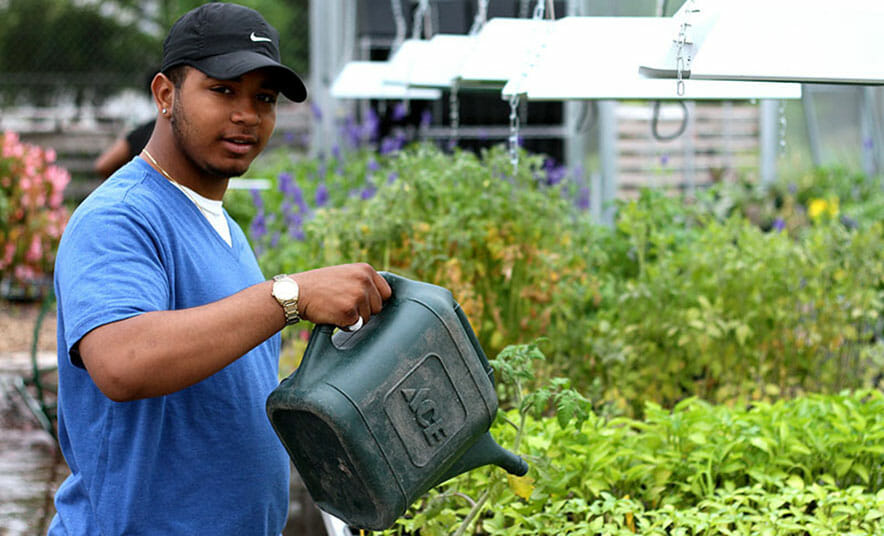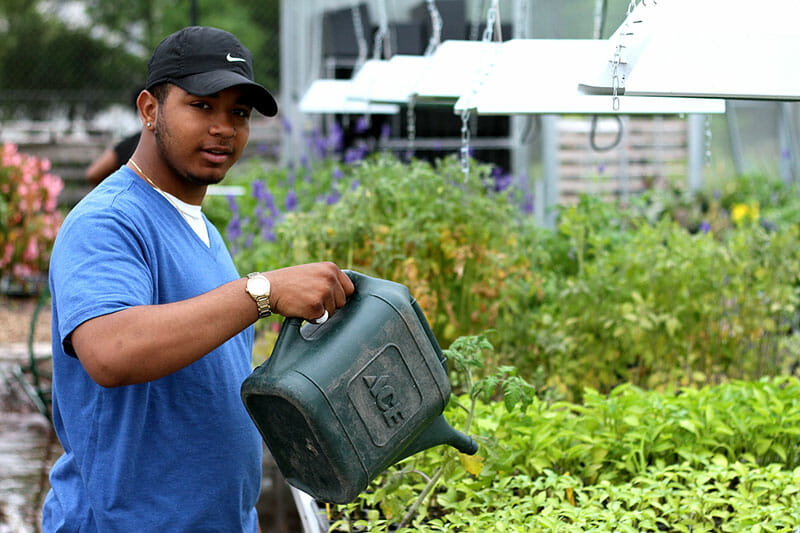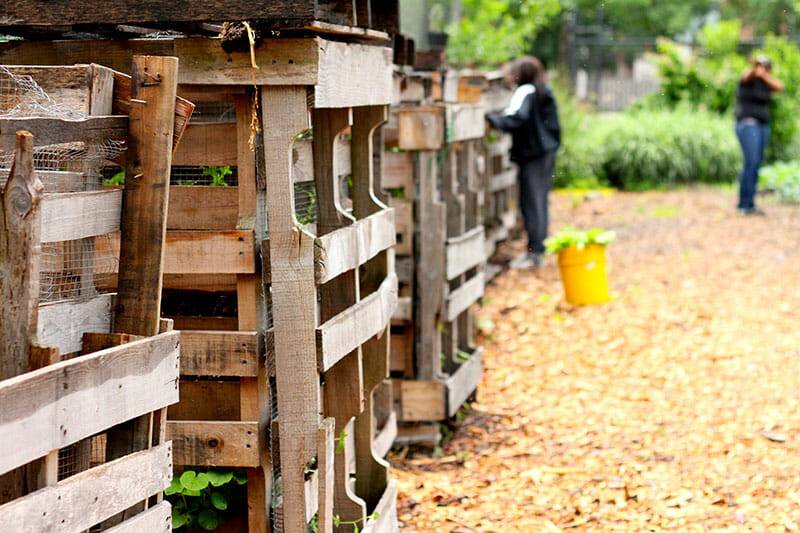A Garden Grows in Cabrini-Green
When Ned Lewis started hanging out at the Chicago Lights Urban Farm at nine years old, he found the labor to be beneath him. "I thought it was slave work" Lewis says.
A Garden Grows in Cabrini-Green
When Ned Lewis started hanging out at the Chicago Lights Urban Farm at nine years old, he found the labor to be beneath him. "I thought it was slave work" Lewis says.

When Ned Lewis started hanging out at the Chicago Lights Urban Farm at nine years old, he found the labor to be beneath him. “I thought it was slave work” Lewis says.
A friend had dragged him to the farm and implored him to help out with watering, weeding, and interacting with the younger kids in order to keep them off the street. Now 19, Lewis says he has “gotten used to” the work and has a different perspective on the garden. “I like coming here,” he says, “because it’s my community.”

That attitude is what has kept Chicago Lights on its feet for the last 10 years, allowing it to bloom into what looks like a successful urban agriculture fairy tale. But there’s a twist: despite being surrounded by high rises and bustling CTA trains, the Chicago Lights farm is located at the heart of Cabrini-Green, a gang-ravaged neighborhood that was once the home of Chicago’s most notorious public housing projects. Though the most poverty-ridden towers have been torn down and the city has worked to turn Cabrini into more of a “mixed income” community, garden director Natasha Holbert says the neighborhood has struggled to adapt.
“The tearing down of the towers changed the dynamics a bit. The community has no identity at this point and they’re struggling to find something in common,” Holbert says. Indeed, the primarily African-American residents don’t typically converse much with the newer, wealthier, and, frankly, whiter members who have moved to the neighborhood in recent years. That’s not the case at Chicago Lights, however, which Holbert says has provided a unique space where there’s “lots of interaction among all kinds of people.” In essence, the farm has helped pull the constantly changing community together.

Chicago Lights was started in 2003 and built entirely atop an empty concrete lot – not that you’d know it from walking between the plots. Holbert says the entire 32,000-square-foot site was built from scratch by trucking in soil and creating their own compost, which they use to continue building the farm’s base every year.
Today, there’s somewhere between 10 to 18 inches of soil on top of the concrete, which is plenty good for most of the food grown there. “We have some trouble growing those giant beefsteak tomatoes, but otherwise we can and do grow pretty much anything,” Holbert said.
Through a 2010 partnership with the nonprofit organization Growing Power, the garden was able to begin offering job training in urban agriculture to youths and turn the site into a commercial farm. Community members are still able to work their own plots, but the farm now sells its produce through a farm stand, a city-wide CSA, and even a bike-centered vegetable delivery service for the neighborhood.
“We don’t have to recruit. The teenagers recruit themselves, and the kids decided on their own that Saturday is ‘farm day,'” Holbert said. With 90 spots for internships and roughly another 70 younger children helping throughout the summer, Holbert says many have raised themselves–and each other–on the urban farm.
Summer program supervisor Stephanie Budd pointed out that while the area isn’t technically a food desert, social norms effectively make it into one. “There’s a grocery store within half a mile, but it crosses gang territory, so residents basically don’t have access to fresh produce,” she said. That’s why she’s so enthused to work with the youth every year, teaching them skills from vermicomposting to marketing for the farm stand. And of course, there’s the attraction of getting healthy food to those who need it the most.
“There’s something about a little kid asking for kale that I just can’t resist,” said Budd.
(Photo Credits: Jacqui Cheng)
Follow us
This work is licensed under a Creative Commons Attribution-NoDerivatives 4.0 International License.
Want to republish a Modern Farmer story?
We are happy for Modern Farmer stories to be shared, and encourage you to republish our articles for your audience. When doing so, we ask that you follow these guidelines:
Please credit us and our writers
For the author byline, please use “Author Name, Modern Farmer.” At the top of our stories, if on the web, please include this text and link: “This story was originally published by Modern Farmer.”
Please make sure to include a link back to either our home page or the article URL.
At the bottom of the story, please include the following text:
“Modern Farmer is a nonprofit initiative dedicated to raising awareness and catalyzing action at the intersection of food, agriculture, and society. Read more at <link>Modern Farmer</link>.”
Use our widget
We’d like to be able to track our stories, so we ask that if you republish our content, you do so using our widget (located on the left hand side of the article). The HTML code has a built-in tracker that tells us the data and domain where the story was published, as well as view counts.
Check the image requirements
It’s your responsibility to confirm you're licensed to republish images in our articles. Some images, such as those from commercial providers, don't allow their images to be republished without permission or payment. Copyright terms are generally listed in the image caption and attribution. You are welcome to omit our images or substitute with your own. Charts and interactive graphics follow the same rules.
Don’t change too much. Or, ask us first.
Articles must be republished in their entirety. It’s okay to change references to time (“today” to “yesterday”) or location (“Iowa City, IA” to “here”). But please keep everything else the same.
If you feel strongly that a more material edit needs to be made, get in touch with us at [email protected]. We’re happy to discuss it with the original author, but we must have prior approval for changes before publication.
Special cases
Extracts. You may run the first few lines or paragraphs of the article and then say: “Read the full article at Modern Farmer” with a link back to the original article.
Quotes. You may quote authors provided you include a link back to the article URL.
Translations. These require writer approval. To inquire about translation of a Modern Farmer article, contact us at [email protected]
Signed consent / copyright release forms. These are not required, provided you are following these guidelines.
Print. Articles can be republished in print under these same rules, with the exception that you do not need to include the links.
Tag us
When sharing the story on social media, please tag us using the following: - Twitter (@ModFarm) - Facebook (@ModernFarmerMedia) - Instagram (@modfarm)
Use our content respectfully
Modern Farmer is a nonprofit and as such we share our content for free and in good faith in order to reach new audiences. Respectfully,
No selling ads against our stories. It’s okay to put our stories on pages with ads.
Don’t republish our material wholesale, or automatically; you need to select stories to be republished individually.
You have no rights to sell, license, syndicate, or otherwise represent yourself as the authorized owner of our material to any third parties. This means that you cannot actively publish or submit our work for syndication to third party platforms or apps like Apple News or Google News. We understand that publishers cannot fully control when certain third parties automatically summarize or crawl content from publishers’ own sites.
Keep in touch
We want to hear from you if you love Modern Farmer content, have a collaboration idea, or anything else to share. As a nonprofit outlet, we work in service of our community and are always open to comments, feedback, and ideas. Contact us at [email protected].by Jacqui Cheng, Modern Farmer
June 30, 2013
Modern Farmer Weekly
Solutions Hub
Innovations, ideas and inspiration. Actionable solutions for a resilient food system.
ExploreExplore other topics
Share With Us
We want to hear from Modern Farmer readers who have thoughtful commentary, actionable solutions, or helpful ideas to share.
SubmitNecessary cookies are absolutely essential for the website to function properly. This category only includes cookies that ensures basic functionalities and security features of the website. These cookies do not store any personal information.
Any cookies that may not be particularly necessary for the website to function and are used specifically to collect user personal data via analytics, ads, other embedded contents are termed as non-necessary cookies.